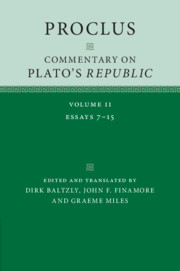Book contents
- Proclus
- Proclus
- Copyright page
- Dedication
- Contents
- Acknowledgements
- Note on the Text and Translation
- General Introduction
- On the Republic of Plato: Essays 7–15
- Introduction to Essay 7
- Essay 7 Proclus the Successor on the demonstrations in the fourth book of the Republic on the three parts of the human soul and the virtues that are 5 in them.
- Introduction to Essays 8 and 9
- Essay 8 236 Concerning the arguments in the fifth book of the Republic showing the virtues and education of men and women to be the same.
- Essay 9 251 An examination of the arguments of Theodore of Asine that render virtue the same for men and women and concerning what 5 Socrates said.
- Introduction to Essay 10
- Essay 10 258 On the discussion in the Fifth Book of the Republic demonstrating what kind the love of 5 learning of philosophers is, and what kind that of the majority.
- Introduction to Essay 11
- Essay 11 269On the Discussion in the Republic Demonstrating What the Good Is
- Introduction to Essay 12
- Essay 12 287On the Cave in the Seventh Book of Republic
- Introduction to Essay 13
- Essay 13 1 By Proclus the Lycian, Diadochus of the Platonic School
- Introduction to Essays 14 and 15
- Essay 14 81 On the Three Arguments Showing that the Just Life is Happier than the Unjust
- Essay 15 84The major sections of the Tenth Book
- References
- English–Greek Glossary
- Greek Word Index
- General Index
Essay 15 - 84The major sections of the Tenth Book
from On the Republic of Plato: Essays 7–15
Published online by Cambridge University Press: 23 June 2022
- Proclus
- Proclus
- Copyright page
- Dedication
- Contents
- Acknowledgements
- Note on the Text and Translation
- General Introduction
- On the Republic of Plato: Essays 7–15
- Introduction to Essay 7
- Essay 7 Proclus the Successor on the demonstrations in the fourth book of the Republic on the three parts of the human soul and the virtues that are 5 in them.
- Introduction to Essays 8 and 9
- Essay 8 236 Concerning the arguments in the fifth book of the Republic showing the virtues and education of men and women to be the same.
- Essay 9 251 An examination of the arguments of Theodore of Asine that render virtue the same for men and women and concerning what 5 Socrates said.
- Introduction to Essay 10
- Essay 10 258 On the discussion in the Fifth Book of the Republic demonstrating what kind the love of 5 learning of philosophers is, and what kind that of the majority.
- Introduction to Essay 11
- Essay 11 269On the Discussion in the Republic Demonstrating What the Good Is
- Introduction to Essay 12
- Essay 12 287On the Cave in the Seventh Book of Republic
- Introduction to Essay 13
- Essay 13 1 By Proclus the Lycian, Diadochus of the Platonic School
- Introduction to Essays 14 and 15
- Essay 14 81 On the Three Arguments Showing that the Just Life is Happier than the Unjust
- Essay 15 84The major sections of the Tenth Book
- References
- English–Greek Glossary
- Greek Word Index
- General Index
Summary
The Tenth Book is divided into three principal topics. The first of these is directed towards a critique of poetry on the grounds that it is mimetic, but not educative of souls. The second establishes the immortality of the soul and reveals its kinship with the divine. The third provides the myth itself, which exhibits providence as a whole, both daemonic and divine, which governs souls both descending into becoming and transcending becoming, and the multi-form ways of each. These being the three subjects, it is clear that the first proposes to separate us from material images (eidôlon) and to lead us up from the illusions (phantasia) of false learning, because these draw us down to the very last of existent things, which are in fact partial (merikos) and imitative of existent things, but do not truly exist themselves, and [to lead us up] from what is simply and entirely a fictive life.
- Type
- Chapter
- Information
- Proclus: Commentary on Plato's 'Republic' , pp. 319 - 331Publisher: Cambridge University PressPrint publication year: 2022

